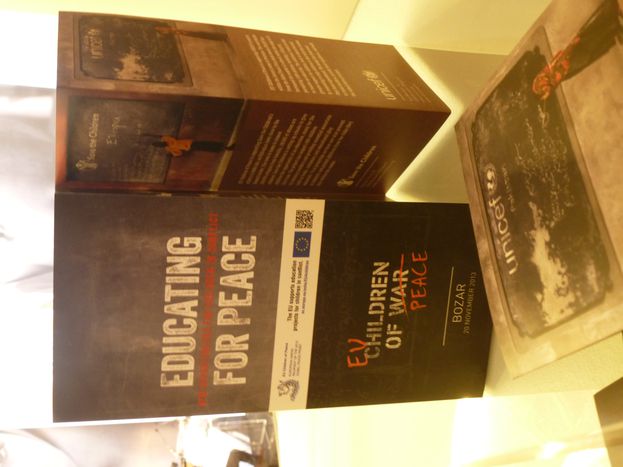
Children of War becoming “EU children of Peace”
Published on
The 20th of November marked the anniversary of Universal Children’s Day, a day of activity that promotes ideas to improve the welfare of children around the world.
Children are the most common innocent victims of political terror. In order to ensure children of security and proper living conditions, the EC created a new initiative - The EU Children of Peace.
The results of the work on the project, which ran for over a year, were presented during a special event on the 20th of November at BOZAR (Centre for Fine Arts) in Brussels. Education, hope, continuity of action and better lives were the keywords repeated during the conference.
The European Commissioner for International Cooperation, Humanitarian Aid and Crisis Response-Kristalina Georgieva-emphasised the idea of a holistic approach to education as “the only way to build lasting peace and sustainable development”.
Also, ensuring hope is one of the missions led by the humanitarian action of the partner organisations in 2013 in different parts of the world: NRC (Norwegian Refugee Council), Acted, UNHRC (The UN Refugee Agency), Save the Children and Unicef.
“Education is the key to support peace in the world”- José Manuel Barroso
When the numbers speak for themselves...
According to the reports coming from the EU:
-1 billion children live in conflict-affected areas of which 300 million are under the age of five.
-Seven million children are refugees and 12.4 million children were displaced within their own countries in 2011 because of the conflict.
-There were 28 million conflict-affected children out of primary education in 2011.
-Three out of the five countries with the highest child mortality rates in 2011 were conflict countries.
“Defending children is defending our future”- Martin Schultz
A few testimonies
Among the participating guests, we heard the story of an African teacher-Lucie-who was the first girl in her village to receive education and get a diploma. Today, she passes this knowledge to the youngest as she believes “children in Congo can have better lives”.
During the week an educational centre in Ecuador hosts children who live far from school. It gathers together 878 pupils. Its teacher present at the event explains her hopes to the Ecuadorian youth: “What keeps me optimistic is to see the children that study and that will have a better future”.
“For children in war” is a personal experience of Monica Pinna, a producer at Euronews channel, in the form of a report after her journey to Colombia, DRC, Iraq and Pakistan. Mrs Pinna underlines in the interview the fact that emergency education in the zones of conflict is a “way of keeping children out of the road and preserving their presence”. According to her, another important issue lies in the question of training teachers to become educators who need to manage a class of up to 130 children. Through dance, singing and play, teachers make their pupils actively participate in the process of learning. Asked about the reaction of children, the journalist says: “Children want to go to school. They are really, really motivated; they participate a lot; they realise that going to school might actually change their lives. They really consider education as a life-changing opportunity”. Mrs Pinna highlights that the projects carried out in the conflict zones not only focus on a child but also cover a family and a community.
“Bringing hope & education to children”- Herman Van Rompuy
What’s next?
The EU initiative on “EU children in peace” will continue in 2014. The EU budget devoted to this action will double its size compared to the actual investment and will reach €4 million next year. Also, nine humanitarian organisations will contribute to helping 80,000 children in conflict zones in the areas of: North-Eastern Afghanistan, South Sudan, Somalia, the Central African Republic, the Democratic Republic of Congo, Iraq, Chad, Columbia and Ecuador.
“Give the children the right to normality, give the children the right to be a child”-
Florika Fink Hooijer, director at ECHO.



